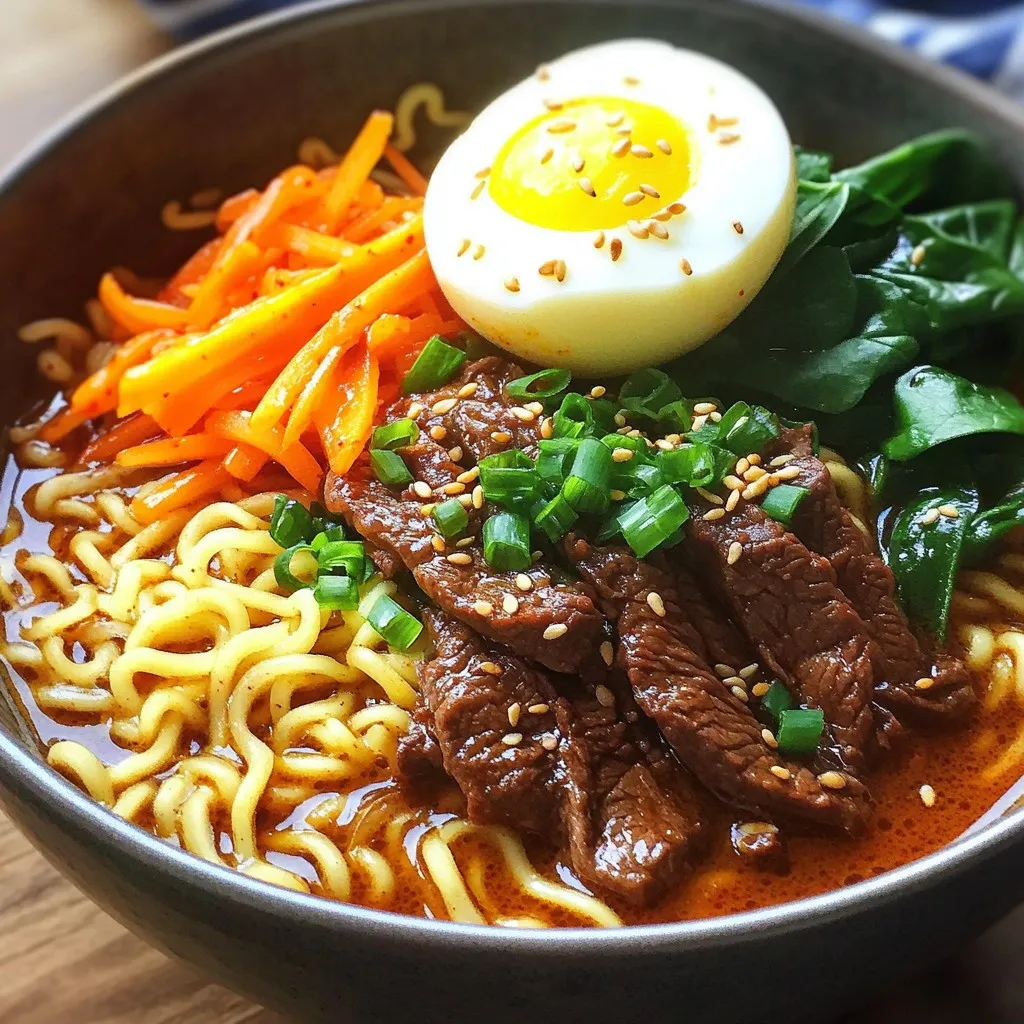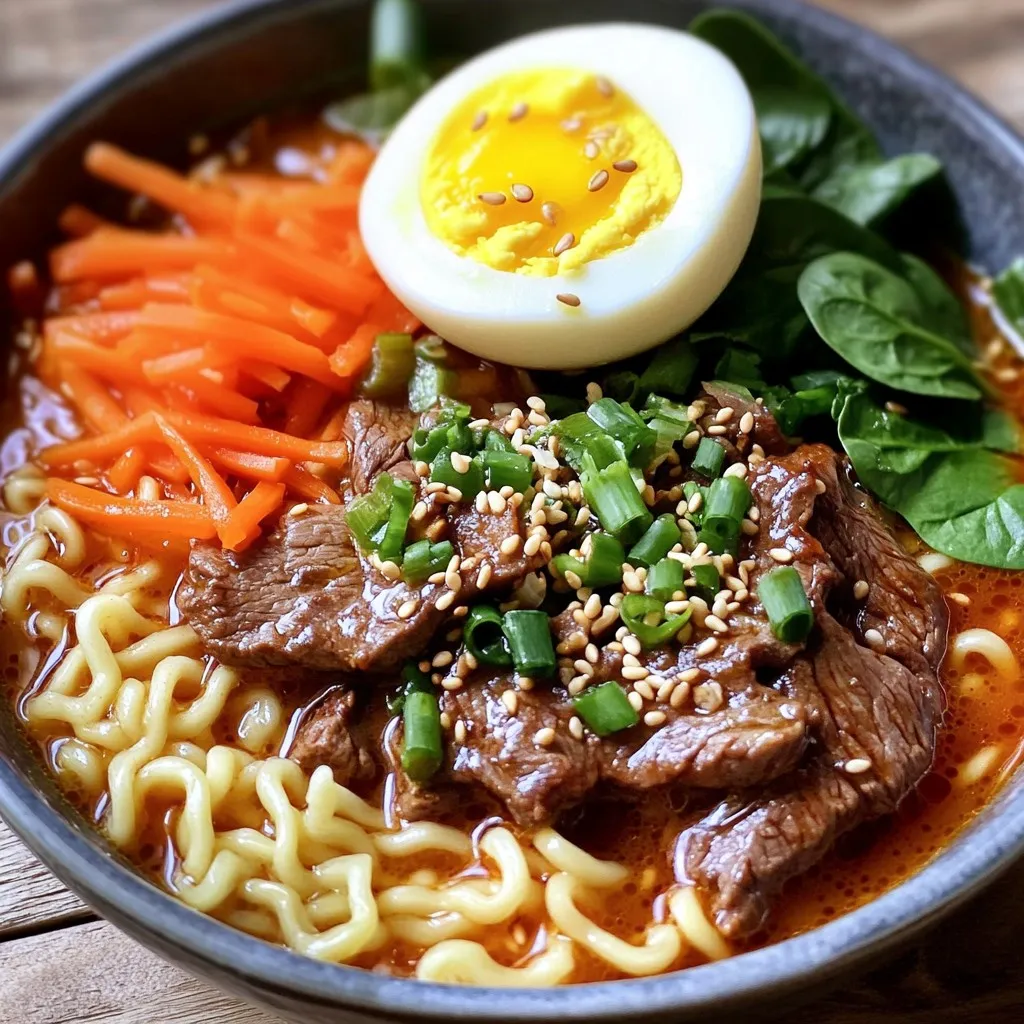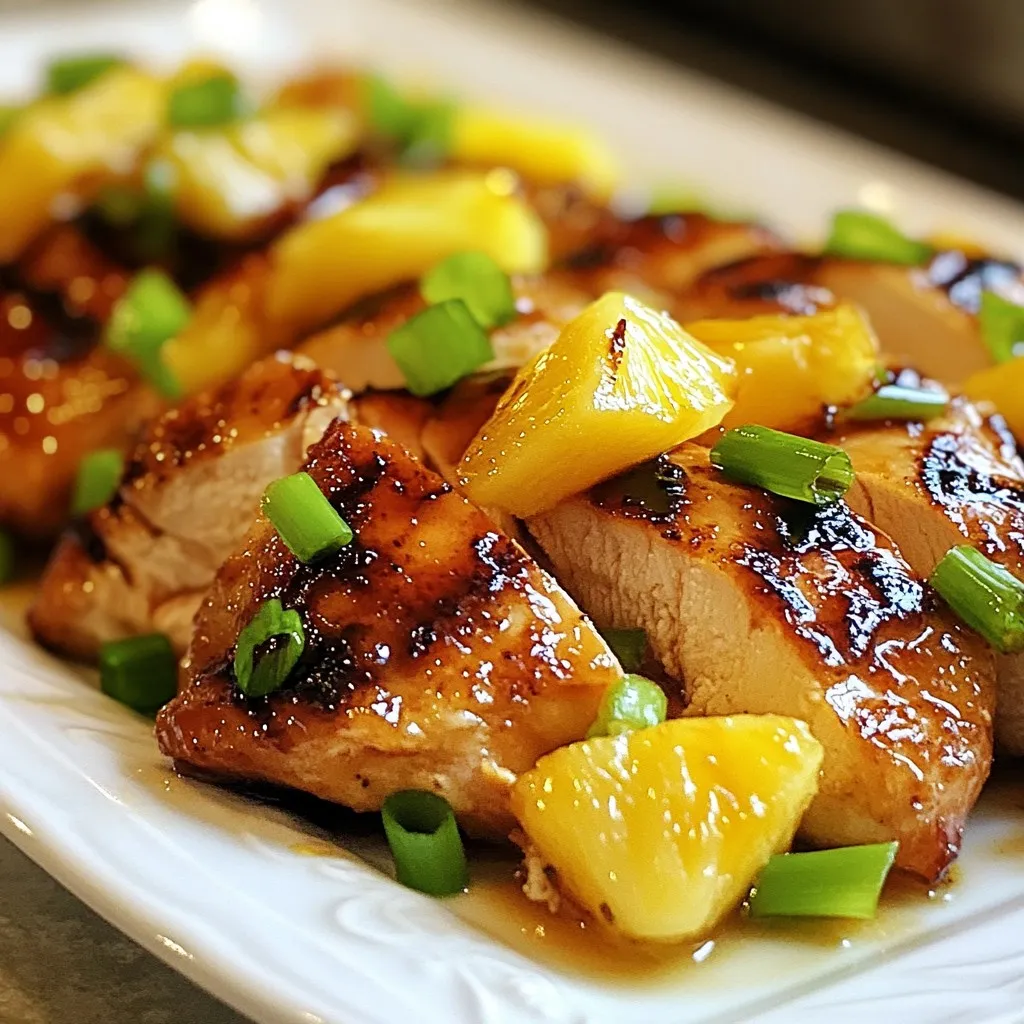
Craving a warm bowl of comfort? My Spicy Korean Beef Ramen is both flavorful and simple to make! This dish combines tender beef, savory broth, and the perfect kick of heat from gochujang. I’ll guide you through every step, from selecting fresh ingredients to tips for spice level adjustments. Whether you’re a kitchen newbie or a seasoned chef, this recipe is sure to impress. Let’s dive in and savor this delicious meal together!
Ingredients
Main Ingredients
– 200g ramen noodles
– 300g thinly sliced beef (sirloin or ribeye)
– 3 cups beef broth
Flavor Enhancers
– 1 tablespoon gochujang (Korean chili paste)
– 1 tablespoon soy sauce
– 1 tablespoon sesame oil
– 1 tablespoon brown sugar
Fresh Produce
– 2 cloves garlic, minced
– 1-inch piece ginger, grated
– 1 carrot, julienned
– 1 cup fresh spinach leaves
– 2 green onions, chopped
Gather these ingredients before you start cooking. Each item adds its own unique taste. The beef gives a hearty base. The ramen noodles soak up all those rich flavors. Gochujang brings heat and depth. Soy sauce adds a savory touch. Sesame oil enhances the aroma. Fresh veggies bring color and nutrition.
When you prepare your ramen, fresh produce makes it vibrant. Garlic and ginger add warmth. Carrots provide a nice crunch. Spinach adds a pop of green. Green onions finish it with brightness. Each ingredient plays a key role in making the dish delicious.
Step-by-Step Instructions
Preparing the Base
Start by heating 1 tablespoon of sesame oil in a large pot over medium-high heat. When the oil is hot, add 2 cloves of minced garlic and a 1-inch piece of grated ginger. Stir them for about 30 seconds. You want to smell that amazing aroma!
Cooking the Beef
Next, add 300 grams of thinly sliced beef to the pot. Stir-fry the beef for 3 to 4 minutes. Look for it to turn a nice brown color, which means it is just cooked through.
Making the Broth
Now, mix in 1 tablespoon of gochujang, 1 tablespoon of soy sauce, and 1 tablespoon of brown sugar. Stir well to coat the beef evenly. Slowly pour in 3 cups of beef broth and bring it to a gentle simmer. Let it cook for about 10 minutes. This will help all the flavors blend together nicely.
Preparing the Ramen Noodles
While the broth simmers, you can prepare the ramen noodles. In a different pot, bring water to a rolling boil. Cook 200 grams of ramen noodles according to the package instructions, usually about 4 to 5 minutes. Once cooked, drain the noodles and set them aside.
Adding Vegetables
Return to your broth. Now it’s time to add some color and nutrition! Add 1 julienned carrot and 1 cup of fresh spinach leaves to the simmering broth. Cook these for another 2 to 3 minutes until the spinach wilts and the carrot becomes tender yet still crisp.
Assembling the Dish
To put it all together, divide the cooked ramen noodles between two bowls. Carefully ladle the hot beef broth with beef and veggies over the noodles. For a special touch, soft-boil an egg by cooking it in boiling water for 6 to 7 minutes. After cooking, place the egg in ice water to cool. Peel and cut it in half before placing it on top of your ramen.
Finish by garnishing each bowl with chopped green onions and sesame seeds. This adds flavor and makes your dish look great!
Tips & Tricks
Cooking Tips
To achieve perfectly cooked beef, choose thin slices of sirloin or ribeye. Heat sesame oil in a large pot over medium-high heat. Add minced garlic and grated ginger, cooking for just 30 seconds. Then, add the beef slices. Stir-fry for 3-4 minutes until the beef is browned and tender. This quick cooking keeps the beef juicy.
Broth Adjustments
You can customize your broth’s spice levels and flavors easily. Start with 1 tablespoon of gochujang for mild heat. If you prefer more spice, add more gochujang gradually. Taste the broth after simmering. Adjust it with salt and pepper to match your liking. Add a splash of soy sauce for extra umami.
Serving Suggestions
Presentation matters! Serve your ramen in deep bowls for a cozy feel. Top each bowl with chopped green onions and sesame seeds for color and crunch. Pair with a side of kimchi for added flavor and a pop of color. Enjoy your meal with chopsticks for an authentic touch!

Variations
Protein Alternatives
You can switch the beef for chicken, tofu, or pork. Each choice brings a new taste. Chicken gives a lighter flavor. Tofu is great for a meatless option. Pork adds a richer touch. Adjust cooking times based on your choice. Chicken will cook faster, while pork may need a bit more time.
Vegetable Substitutes
Feel free to get creative with your vegetables. Seasonal veggies work well here. Try using mushrooms or bok choy for a unique twist. Bell peppers add a nice crunch. Zucchini or snap peas also fit perfectly. Choose what you enjoy or what you have on hand. It’s all about making it your own.
Broth Alternatives
If you want to mix it up, try different broths. Miso broth adds a savory depth. Vegetable broth works well for a lighter option. You can even use chicken broth if you prefer. Each choice will change the flavor profile. Experiment to find your favorite combination.
Storage Info
Storing Leftovers
To keep your Spicy Korean Beef Ramen fresh, store it in an airtight container. Place the ramen noodles and broth in separate containers. This way, the noodles won’t soak up all the broth. Refrigerate them within two hours of cooking. When you want to eat leftovers, reheat the broth on the stove. Add the noodles in the last minute of heating.
Freezing Instructions
You can freeze the beef broth and cooked beef for later use. Let them cool completely before freezing. Use freezer-safe bags or containers. For ramen, freeze the noodles separately. To thaw, move the containers to the fridge overnight. Reheat the broth and noodles together when ready to eat.
Shelf Life
In the fridge, the ramen lasts for about 3 days. If you freeze it, the broth keeps well for up to 3 months. The noodles freeze for about 2 months. Always check for any signs of spoilage before using leftovers.
FAQs
How can I make Spicy Korean Beef Ramen spicier?
To heat things up, add more gochujang. You can use extra chili paste or fresh chili peppers, too. If you want a kick, try adding sliced jalapeños or red pepper flakes. Adjust to your taste, so it’s just right for you.
Can I use different types of noodles?
Yes, you can! While ramen noodles are great, you can use udon or soba noodles. Just make sure to cook them according to package instructions. They will change the texture, but they will still taste amazing.
What is the best way to soften the egg for topping?
To soft-boil an egg, cook it in boiling water for 6-7 minutes. Then, place it in ice water to stop the cooking. After cooling, peel it and cut it in half. This gives a creamy yolk that makes the ramen richer.
Is it necessary to include vegetables?
No, it’s not a must. However, vegetables like carrots and spinach add flavor and nutrients. You can also add mushrooms, bell peppers, or bok choy. Feel free to mix in what you like or have on hand.
How do I make this dish gluten-free?
To make it gluten-free, use gluten-free ramen noodles. Check that your broth and sauces, like soy sauce, are gluten-free. Tamari is a good gluten-free option for soy sauce. This way, you can enjoy this dish without worry.
In this blog post, we explored how to make Spicy Korean Beef Ramen. We covered key ingredients like ramen noodles, beef, and flavorful enhancers. I shared step-by-step instructions for preparing a rich broth and cooking vegetables. You also learned tips for customizing flavors and storing leftovers.
You can enjoy many variations with different proteins and broths. With these steps, you can create a warm, tasty meal any time. Dive in, get cooking, and enjoy your delicious ramen!

Spicy Korean Beef Ramen
A flavorful and spicy ramen dish featuring tender beef, vegetables, and a rich broth.
Ingredients
Instructions
- 1
Begin by heating the sesame oil in a large pot over medium-high heat. Once the oil is hot, add the minced garlic and freshly grated ginger, stirring for about 30 seconds until they release their fragrant aroma.
- 2
Next, add the thinly sliced beef to the pot. Stir-fry for approximately 3-4 minutes, or until the beef is nicely browned and just cooked through.
- 3
Incorporate the gochujang, soy sauce, and brown sugar into the pot, stirring thoroughly to ensure that the beef is evenly coated with the flavorful mixture.
- 4
Slowly pour the beef broth into the pot and bring the concoction to a gentle simmer. Allow it to cook for around 10 minutes so that the flavors can wonderfully meld together.
- 5
While the broth simmers, prepare the ramen noodles. In a separate pot, bring water to a rolling boil and cook the ramen noodles according to the package instructions (usually about 4-5 minutes). Once cooked, drain the noodles and set them aside.
- 6
Back to the broth – add the julienned carrot and fresh spinach leaves to the simmering beef broth. Cook these for an additional 2-3 minutes until the spinach has wilted and the carrot is tender yet still crisp.
- 7
Taste the broth at this stage, and adjust the seasoning with salt and pepper as per your liking.
- 8
To assemble your delightful bowl of ramen, divide the cooked ramen noodles between two serving bowls. Carefully ladle the hot beef broth mixture over each portion of noodles, ensuring a generous serving of beef and vegetables for a full experience.
- 9
If you’d like to add an egg as a topping, soft-boil it by cooking in boiling water for 6-7 minutes. Once done, transfer it to a bowl of ice water to cool, then peel and cut it in half. Place the halved egg atop your ramen for a gourmet touch.
- 10
Finish your dish by garnishing each bowl with a sprinkle of chopped green onions and sesame seeds, adding both flavor and a decorative flourish before serving.
Chef's Notes
Serve the ramen in deep bowls for a comforting appearance. Consider adding a side of kimchi to enhance the meal.

Recipe Creator
Remy
I’m Chef Remy, your recipe companion, here to bring warmth, bold taste, and simplicity to your kitchen.
View My Recipes

